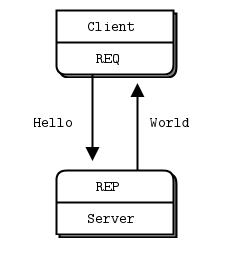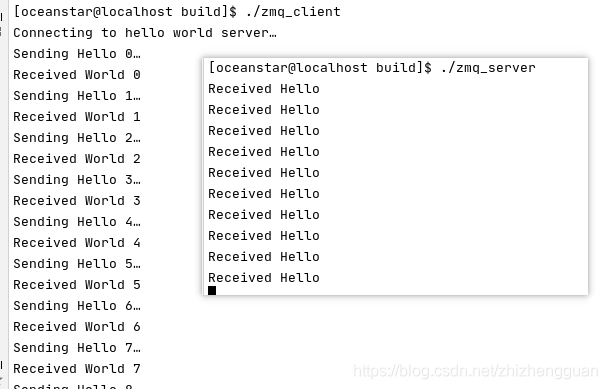获取例子:
git clone --depth=1 https://github.com/imatix/zguide.git
获取版本
ZeroMQ确实有多个版本,并且经常出现问题,如果您遇到问题,它将在更高版本中得到修复。因此,准确地知道您实际链接的ZeroMQ版本是一个有用的技巧。
C
#include <zmq.h>
int main (void)
{
int major, minor, patch;
zmq_version (&major, &minor, &patch);
printf ("Current 0MQ version is %d.%d.%d\n", major, minor, patch);
return 0;
}
请求-答复模式
(Hello World CS)
效果:客户端向服务器发送“ Hello”,服务器回复“ World”

服务端
效果:在端口12345上打开ZeroMQ套接字,读取该端口上的请求,并对每个请求回复“World”
#include <zmq.h>
#include <stdio.h>
#include <unistd.h>
#include <assert.h>
int main (void)
{
// Socket to talk to clients
void *context = zmq_ctx_new ();
void *responder = zmq_socket (context, ZMQ_REP);
int rc = zmq_bind (responder, "tcp://*:5555");
assert (rc == 0);
while (1) {
char buffer [10];
zmq_recv (responder, buffer, 10, 0);
printf ("Received Hello\n");
sleep (1); // Do some 'work'
zmq_send (responder, "World", 5, 0);
}
return 0;
}
客户端
// Hello World client
#include <zmq.h>
#include <string.h>
#include <stdio.h>
#include <unistd.h>
int main (void)
{
printf ("Connecting to hello world server...\n");
void *context = zmq_ctx_new ();
void *requester = zmq_socket (context, ZMQ_REQ);
zmq_connect (requester, "tcp://localhost:5555");
int request_nbr;
for (request_nbr = 0; request_nbr != 10; request_nbr++) {
char buffer [10];
printf ("Sending Hello %d...\n", request_nbr);
zmq_send (requester, "Hello", 5, 0);
zmq_recv (requester, buffer, 10, 0);
printf ("Received World %d\n", request_nbr);
}
zmq_close (requester);
zmq_ctx_destroy (context);
return 0;
}

文件传输
1、服务器
#include <zmq.h>
#include <stdio.h>
#include <unistd.h>
#include <assert.h>
#include <cstring>
#include <malloc.h>
#include <sstream>
#include <vector>
#define BUFSIZE 262144 //256k
using namespace std;
//ostringstream对象用来进行格式化的输出,常用于将各种类型转换为string类型
//ostringstream只支持<<操作符
template<typename T> string toString(const T& t){
ostringstream oss; //创建一个格式化输出流
oss<<t; //把值传递如流中
return oss.str();
}
void SplitString(const std::string& s, std::vector<std::string>& v, const std::string& c)
{
std::string::size_type pos1, pos2;
pos2 = s.find(c);
pos1 = 0;
while(std::string::npos != pos2)
{
v.push_back(s.substr(pos1, pos2-pos1));
pos1 = pos2 + c.size();
pos2 = s.find(c, pos1);
}
if(pos1 != s.length())
v.push_back(s.substr(pos1));
}
int main (void)
{
// Socket to talk to clients
void *context = zmq_ctx_new ();
void *socket = zmq_socket (context, ZMQ_REP);
int rc = zmq_bind (socket, "tcp://*:5555");
assert (rc == 0);
char *buf = (char *)malloc(BUFSIZE);//申请一个缓冲区,存放接收到的文件内容
memset(buf, 0, BUFSIZE);
rc = zmq_recv (socket, buf, BUFSIZE, 0);
if (rc == -1){
printf("sorry, zmq_recv failed %s\n", zmq_strerror(errno));
return 0;
}
printf ("Received %s\n", buf);
FILE *fd;
int total = 0;
std::string rs ;
std::vector<std::string> v;
SplitString(buf, v, "_");
if(v.size() != 2){
memset(buf, 0, BUFSIZE);
strcpy(buf, "name_total");
}else{
total = atoi(v[1].c_str());
fd = fopen(v[0].c_str(), "wb");//以只写方式打开文件
if (fd == NULL){
memset(buf, 0, BUFSIZE);
snprintf(buf, BUFSIZ, "open %s failed %s\n", v[0].c_str(), strerror(errno));
printf("open %s failed %s\n", v[0].c_str(), strerror(errno));
}else{
memset(buf, 0, BUFSIZE);
strcpy(buf, "ok");
}
}
zmq_send (socket, buf, strlen(buf), 0);
while (true) {
memset(buf, 0, BUFSIZE);
rc = zmq_recv (socket, buf, BUFSIZE, 0);
if (rc == -1){
printf("sorry, zmq_recv failed %s\n", zmq_strerror(errno));
break;
}else{
printf("ok = %d\n", rc);
}
fwrite(buf, 1, rc, fd);//将从client端收到的内容写入文件
total = total - rc;
if(total == 0){
printf("finished");
fclose(fd);//关闭打开的文件
}
memset(buf, 0, BUFSIZE);
snprintf(buf, BUFSIZ, "%d\n", rc);
zmq_send (socket, buf, strlen(buf), 0);
}
free(buf);
zmq_close(socket);
zmq_ctx_destroy(context);
return 0;
}
2、客户端
// Hello World client
#include <zmq.h>
#include <string.h>
#include <stdio.h>
#include <unistd.h>
#include "File.h"
#define BUFSIZE 262144 //256k
void getfilename(const char *filename, char *name)//从完整路径名中解析出文件名称,例如:/home/test/abc.txt,解析完成后为abc.txt
{
int len = strlen(filename);
int i;
for (i = (len - 1); i >= 0; i--)
{
if ((filename[i] == '\\') || (filename[i] == '/'))
{
break;
}
}
strcpy(name, &filename[i + 1]);
return;
}
int main (void)
{
printf ("Connecting to hello world server...\n");
void *context = zmq_ctx_new ();
void *socket = zmq_socket (context, ZMQ_REQ);
zmq_connect (socket, "tcp://192.168.0.12:5555");
const char * filename = "/home/oceanstar/CLionProjects/acl.tar.gz";
FILE *file = fopen(filename, "rb");//以只读方式打开filename指定的文件
if (file == NULL)//如果文件打开失败,函数返回
{
printf("open %s failed %s\n", filename, strerror(errno));
return 0;
}
char *buf = (char *)malloc(BUFSIZE);//申请一个缓冲区,存放接收到的文件内容
char name[256] ;
getfilename(filename, name);
rewind(file);
fseek(file,0L,SEEK_END);
long length=ftell(file);
rewind(file);
printf("%s has [%ld] characters...", name, length);
memset(buf, 0, BUFSIZE);
snprintf(buf, BUFSIZ, "%s_%ld\n", name, length);
int rc;
rc = zmq_send(socket, buf, strlen(buf), 0);
if (rc == -1){
printf("send filename failed %s\n", zmq_strerror(errno));
}
rc = zmq_recv (socket, buf, BUFSIZE, 0);
if (rc == -1){
printf("sorry, zmq_recv ok failed %s\n", zmq_strerror(errno));
return 0;
}
if (strncmp(buf, "ok", 2) != 0){
printf("sorry, server error %s\n", zmq_strerror(errno));
return 0;
}
while (true){
memset(buf, 0, BUFSIZE);
rc = fread(buf, 1, BUFSIZE, file);
if (rc <= 0)
{
if (rc < 0)
printf("fread failed %s\n", strerror(errno));
break;
}
printf("file = %d\t", rc);
rc = zmq_send(socket, buf, rc, 0);
if (rc == -1){
printf("send failed %s\n", zmq_strerror(errno));
}else{
printf("ok = %d\t\t", rc);
}
memset(buf, 0, BUFSIZE);
rc = zmq_recv (socket, buf, BUFSIZE, 0);
printf("%d, %s\n", rc, buf);
}
fclose(file);
zmq_close (socket);
zmq_ctx_destroy (context);
return 0;
}
发布-订阅模式(天气 CS)

效果:
-
服务器先启动:
- 服务器会一直运行(while),这个期间只要有客户端连上来了,服务器就会主动往客户端发送消息。当客户端接收完消息,客户端会停止
-
客户端先启动:
- 客户端会一直阻塞,直到接收到服务器发送的消息,才会停止
C
服务器
#include <zmq.h>
#include <assert.h>
#include <stdio.h>
#include <stdlib.h>
#include <string.h>
#include <time.h>
// Provide random number from 0..(num-1)
#define randof(num) (int) ((float) (num) * random () / (RAND_MAX + 1.0))
// Convert C string to 0MQ string and send to socket
static int s_send (void *socket, char *string) {
int size = zmq_send (socket, string, strlen (string), 0);
return size;
}
int main (void)
{
// Prepare our context and publisher
void *context = zmq_ctx_new ();
void *publisher = zmq_socket (context, ZMQ_PUB);
int rc = zmq_bind (publisher, "tcp://*:5556");
assert (rc == 0);
// Initialize random number generator
srandom ((unsigned) time (NULL));
while (1) {
// Get values that will fool the boss
int zipcode, temperature, relhumidity;
zipcode = randof (100000);
temperature = randof (215) - 80;
relhumidity = randof (50) + 10;
// Send message to all subscribers
char update [20];
sprintf (update, "%05d %d %d", zipcode, temperature, relhumidity);
s_send (publisher, update);
}
zmq_close (publisher);
zmq_ctx_destroy (context);
return 0;
}
客户端
#include <zmq.h>
#include <assert.h>
#include <stdio.h>
#include <stdlib.h>
#include <string.h>
// Receive 0MQ string from socket and convert into C string
// Caller must free returned string. Returns NULL if the context
// is being terminated.
static char *s_recv (void *socket) {
enum { cap = 256 };
char buffer [cap];
int size = zmq_recv (socket, buffer, cap - 1, 0);
if (size == -1)
return NULL;
buffer[size < cap ? size : cap - 1] = '\0';
#if (defined (WIN32))
return strdup (buffer);
#else
return strndup (buffer, sizeof(buffer) - 1);
#endif
// remember that the strdup family of functions use malloc/alloc for space for the new string. It must be manually
// freed when you are done with it. Failure to do so will allow a heap attack.
}
int main (int argc, char *argv [])
{
// Socket to talk to server
printf ("Collecting updates from weather server...\n");
void *context = zmq_ctx_new ();
void *subscriber = zmq_socket (context, ZMQ_SUB);
int rc = zmq_connect (subscriber, "tcp://localhost:5556");
assert (rc == 0);
// Subscribe to zipcode, default is NYC, 10001
const char *filter = (argc > 1)? argv [1]: "10001 ";
rc = zmq_setsockopt (subscriber, ZMQ_SUBSCRIBE,
filter, strlen (filter));
assert (rc == 0);
// Process 100 updates
int update_nbr;
long total_temp = 0;
for (update_nbr = 0; update_nbr < 100; update_nbr++) {
char *string = s_recv (subscriber);
int zipcode, temperature, relhumidity;
sscanf (string, "%d %d %d",
&zipcode, &temperature, &relhumidity);
total_temp += temperature;
free (string);
}
printf ("Average temperature for zipcode '%s' was %dF\n",
filter, (int) (total_temp / update_nbr));
zmq_close (subscriber);
zmq_ctx_destroy (context);
return 0;
}
在字符串上的小注解
除字节大小之外,ZMQ对你发送的数据一无所知。这意味着你有责任安全的格式化数据,使得应用程序可以读取它
- 在C语言和某些其他语言中,字符串以空字节终止。我们可以发送一个像“ HELLO”这样的字符串,并带有一个额外的空字节:
zmq_send (requester, "Hello", 6, 0);
- 但是,如果您使用其他语言发送字符串,则该字符串可能不会包含该空字节。例如,当我们在Python中发送相同的字符串时,我们将执行以下操作:
socket.send ("Hello")
-
如果您从C程序中读取此内容,可能会得到一个错误的结果。也就是说,当您的客户端和服务器在字符串格式上不一致时,您将得到奇怪的结果。
-
因此,让我们建立一个规则,即ZeroMQ字符串是长度指定的,并且在发送时不带尾随null。在最简单的情况下(我们将在示例中进行此操作),ZeroMQ字符串整齐地映射到ZeroMQ消息帧,它看起来像下图所示—一个长度和一个字节

在zhelpers.h,封装了很多有用辅助函数,比如下面函数可以帮助接收ZeroMQ字符串并将其作为有效的C字符串传递给应用程序
#include <zmq.h>
#include <memory.h>
//从套接字接收ZeroMQ字符串并转换为C字符串
//如果字符串长度较长,则将字符串截断为255个字符
static char *s_recv (void *socket) {
char buffer [256];
int size = zmq_recv (socket, buffer, 255, 0);
if (size == -1)
return NULL;
if (size > 255)
size = 255;
buffer [size] = '\0';
/* 在*nix中使用strndup(buffer, sizeof(buffer)-1)*/
return strdup (buffer);
}





















 8819
8819











 被折叠的 条评论
为什么被折叠?
被折叠的 条评论
为什么被折叠?








